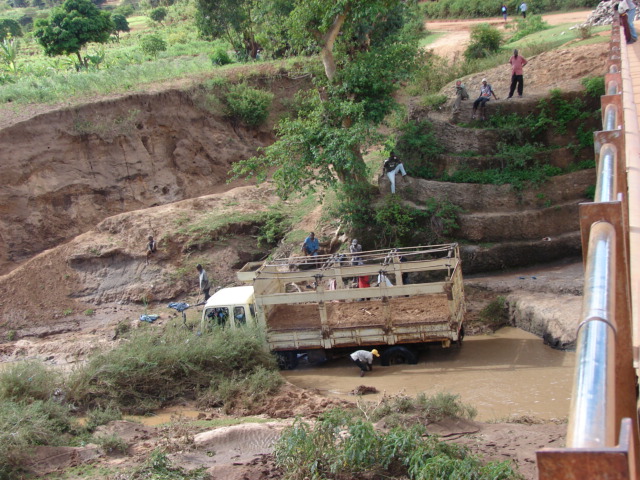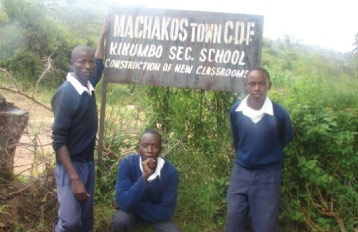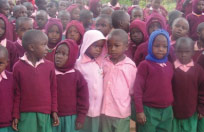Introduction
The Kenyan dry lands also known as Arid and Semi –arid areas (ASALs) are richly endowed with natural resources and make significant contribution to the national economy. Kenyan dry lands are home to more than 30% of the country’s population. Despite their enormous potential, dry lands have the highest poverty levels because of the radiating resource degradation and increased utilization pressure. However, decreasing rural incomes have led the communities to adopt unsustainable survival techniques, leading to a degraded environment. The poor natural resources management practices are normally characterized by clearing of land for cultivation, cutting of trees for fuel wood, quarrying as well as uncontrolled sand harvesting.
Such activities have led to land degradation, deforestation, loss of biodiversity and severe water shortages that affect people’s livelihoods negatively and increase the poverty levels. This has called for support and empowerment of local communities to address the pressure set to the natural resources due to unsteady management.
PEN Interventions
The concern for a healthy and clean environment is one of PEN’s leading key values towards poverty alleviation among communities. This is done through various programs involving capacity building of the local communities by organizing workshops, environmental advocacy forums and tree planting campaigns.
In respect to the environmental degradation in the larger Machakos District (now Machakos County), PEN worked with community based organizations (CBOs) to create environmental awareness and advocacy campaigns to fight environmental-aligned poverty. From 2004, PEN initiated various programs to help communities to improve their livelihoods’ security and realize the Millennium Development Goals (MDGs) that have since evolved to Sustainable Development Goals (SDGs).
Between 2005 and 2011, PEN partnered with 10 CBOs in Machakos, Mwala and Kangundo Districts to undertake environmental project, “The Billion Tree Campaign” that aimed at planting one (1) billion trees by communities within the region. This saw the organizing of community tree planting and environmental awareness days in successive years within such Districts resulting to massive tree planting. PEN supported establishment of tree nurseries for propagation and raising of tree seedlings for planting in degraded areas, farms, riparian areas and also serve as income generating opportunities.
A community tree nursery
In 2009, the Community Development Trust Fund/Community Environmental Facility (CDTF/CEF) funded PEN to conduct the project on “Responsible and sustainable sand harvesting for poverty reduction and environmental conservation”. This project aimed at advocating for sustainable sand harvesting for profitability and relieve the community from abject poverty. It also aimed at empowering the local communities to realize the need of diversifying their sources of livelihoods to avoid overdependence on sand harvesting as a way of reducing poverty.
The project was undertaken by conducting environmental trainings to 50 selected community representatives in Mwala, Kangundo and Machakos districts to act as community resource persons. The trainings majored on tree nursery management; environmental leadership; management of riparian areas; and, environmental legislations and policies [such as Environmental Management and Coordination Act (EMCA), 1999 and National Sand Harvesting Guidelines (NSHG), 2007). The program also supported 50 community groups and 21 schools in the area with seeds and other materials to establish tree nurseries for environmental rehabilitation initiatives.
Further, PEN organized environmental advocacy forums at both divisional and district levels targeting decision makers and local community for them to adopt rational and sustainable measures for sand harvesting. Radio talk show programme was held in a local FM station (Mbaitu FM) addressing issues of responsible and sustainable sand harvesting for poverty alleviation. This was meant to create awareness and sensitize the local communities in ways of addressing the negative impacts imparted by the uncontrolled sand harvesting business.
Impact results
The damage of environmental degradation realized after mass awareness creation on environmental conservation campaigns seemed to have suddenly prompted most groups in the lager Machakos district to start tree planting initiatives in earnest. Community groups donated thousands of tree seedlings which were used during community tree planting days organized in Machakos, Mwala and Kangundo districts. Through this, PEN has mobilized the communities and schools in the area to plant over 700, 000 tree seedlings in public areas, own farms and degraded sites. This was meant to improve the vegetation cover and help community adopt agro-forestry which is environment friendly and for reclamation of degraded areas.
Through such campaigns, communities have embraced the tree planting activity and are playing a key role towards environmental conservation initiatives by organizing community tree planting days. Various community groups have established commercial tree nurseries as alternative income generating activity (IGAs).
PEN trained over 50 community representatives (TOTs) on environmental legislations; EMCA 1999, and the NSHG, 2007, the representatives work as resource people in the community and are spearheading advocacy activities on environmental conservation.
“We were supported with materials and seeds by PEN to establish tree nurseries in the year 2006, and since then we have been able to sell seedlings worth Kshs 70,000. With that money, we managed to buy a goat for each of the 29 group members”, Sabinah Mutisya of Kalama division, and Secretary Kaloloini SHG.
Training various leaders on environmental leadership led to the creation of Divisional Environmental Committees at Kakuyuni, Masii, and Kalama divisions. The committees are actively involved in monitoring environmental activities at local level.
Through local forums and radio talk show programme, community leaders and members were sensitized on environmental protection and continue to lobby relevant authorities towards safeguarding community resources. This led to the then Provincial Administration banning sand harvesting in several areas in Machakos, Kangundo and Mwala districts until appropriate harvesting mechanisms are put in place.
Communities in the larger Machakos have understood the negative impacts associated with unsound environmental management practices. If sustainably managed, such resources can be a viable effort that can turn around the economy of the community in the larger Machakos region. PENS continue to support and work with communities for sustainable environmental conservation.
“After attending trainings organized by PEN on Environmental Management and Coordination Act and National Sand Harvesting Guidelines, 2007” , says Geoffrey Mutua of Kangundo – Kakuyuni division and Kyevaluki CBO, “we have come together as members of the community to discourage uncontrolled sand harvesting which is causing our streams and rivers to dry. Sand is a resource that is meant to benefit us all and not a few members of the society.”




